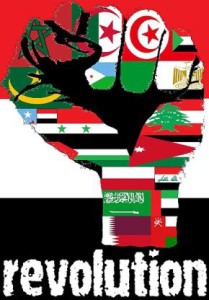 . The insurrections produced anarchy in Libya, civil war in Egypt, and now devolution in Yemen and Syria. It is true that democratic transitions have never been peaceful and are mostly violent. We witnessed transition from communism in Europe, for example, the fall of Berlin Wall, the rise of a criminal mafia, a war in Bosnia between Serbians and Muslims, and the Balkans’ degeneration into ethnic war; even today, there are still tensions between ethnic groups in several central Asian countries like Uzbekistan, Kazakhstan, and Turkmenistan, all from the former Soviet Bloc with the people living under repressive regimes, yet not many want to go back to live under the Soviet regime.
. The insurrections produced anarchy in Libya, civil war in Egypt, and now devolution in Yemen and Syria. It is true that democratic transitions have never been peaceful and are mostly violent. We witnessed transition from communism in Europe, for example, the fall of Berlin Wall, the rise of a criminal mafia, a war in Bosnia between Serbians and Muslims, and the Balkans’ degeneration into ethnic war; even today, there are still tensions between ethnic groups in several central Asian countries like Uzbekistan, Kazakhstan, and Turkmenistan, all from the former Soviet Bloc with the people living under repressive regimes, yet not many want to go back to live under the Soviet regime.
For democracy to flourish in the Arab countries, first they need to have democratic institutions to help make better transitions. I do not think the Arab countries have democratic institutions, so as a result, “people power” creates anarchy and more dictatorships. The second reason is the variable of religion, because Islam is not compatible with democracy primarily since its definition is not the same as the Western notion of democracy. Third, and most importantly, the Arab revolution has not been successful as expected, because of the lack of a charismatic leadership who could manage to unite the people around a definite cause. Leaders need only look at history to see this need, just as Niccole Machiavelli said, “Whoever wishes to foresee the future must consult the past.” Vladimir Lenin also observed this necessity, “No revolutionary movement could endure without stable organizations of leaders.” The history of social movements teaches us that sustaining a movement requires extensive planning and coordination that need organization and leadership to run the society or government effectively.
The Arab Spring did not come from a desire for democracy; it came from changes around the world and in the region, some factors have played a role in the Arab revolutions, such as the flow of information, unemployment, despotism, corruption, and injustice—all variables that caused the discontent to rise up against the autocratic regimes and military dictatorships who ruled over them in their hope for greater freedom, democracy, pluralism, as well as social, economic, and political justice.
I was very skeptic about the whole Arab Spring right from the beginning. Since I have traveled in the Middle East and studied it for decades, I understood Arab youth! Most of the people in that part of the world believe strongly in the power of the state because the state does everything for them, including giving them social, political and economic benefits. They might disagreed as to how the state uses its power, but they almost all strongly believe that it is the state’s duty to shape their lives and to take care of the society. Further, not many of the young population of the Muslim world are very conservative, even the Salafis. I have friends from North Africa, Saudi Arabia, and the Middle East, and they do not even pray, but always go to bars to drink and even to pick up girls if they can, yet at the same time they would express a strong desire for an Islamic State. They may not like the Infidels of the West, but they love to live the way the West lives. Therefore, since the majority of the Arab revolutions were supported by the Arab youth, I would not put too much faith in some young men being so uprooted from their true origins. Ironically, many Muslims or Arabs hate the West or America, but if they have a chance to go to the U.S., they are the ones who will have the first ticket to go there. Likewise, many who go to live in America continue to complain about its racism, rules, or even debauchery, but never want to return to their home countries.
For revolution to be successful it requires the internal transformation of people who are willing to lead in order to bring about such change. Mahatma Gandhi was a great example of a life driven by an inner faith in truth, nonviolence, and service to others. His leadership involved working with diverse groups of people and all walks of life with the aim of resisting injustice, racism, and oppression in favor of working toward the betterment of all people, not a certain group with one belief or of one race. On the other hand, if Egyptian President Morsi had not grabbed power and changed the constitution to his liking, he probably would still be the President of Egypt, but Egypt lacked democratic institutions that could force the government to make a transition.
As Muslim countries seek change, the question, however, is whether Sharia law is the answer to all the problems of modernity that we face? The other problem with revolution is the identity problem, the cleavage between those who would emphasize an Arab national identity or the Islamic religious identity as more important. The Arab Spring or Arab Revolution was run by the technology of well-speaking English and Al Jazeera news media, Google executives, and tweet-fed revolts. A small fire becomes enflamed quickly through these media.
The real revolution is not so much on the town squares as in the mind. Arabs and others in the region are learning that democracy is neither just a question of elections nor the ability to bring millions of protesters onto the street. To understand the real requirements for democracy is to understand the Arab societies. For example, Libya is a tribal society that did not even have a written constitution, and such a lack of institutions will take decades for the people to understand what revolution is and what it means to have one. Since World War I some of the Muslim nations desired to modernize and to develop their countries in order to save them from the weaknesses of a Western domination.
The Arab revolution has now moved away from grand ideologies of a decentralized, pluralistic, hybrid government. Most of the protesters were young and were geared toward the ideals of social equality, jobs, democracy, and human rights. The problem, however, was a lack of a charismatic leader to unite them and a lack of democratic institutions to help make the transition peaceful. For example, in Turkey for decades a fundamental sect of Muslims have infiltrated every institution such as the military, judiciary, police, universities, and other sectors of the bureaucracy, so that when the Justice and Development Party, the AKP Islamic Party, came to power, it was easy for them to get rid of secularism because of a charismatic leader like Erdogan, initially the Prime Minister but now after a constitutional change, the President. Religious leader Fethullah Gulen united so many young people under a unifying creed, but the Arab revolution moved away from the grand ideologies and became concerned only about putting an end to dictators, totalitarianism, and economic decline. Only Turkey has purported to have pioneers of modernization and democratization in the Middle East, even if perhaps because of its bid for the European Union. Nevertheless, none of the Arab countries have developed the same level of democratic institutions.
Dr. Aland Mizell is President of the MCI and a regular contributor to Mindanao Times. You may email the author at:aland_mizell2@hotmail.com

